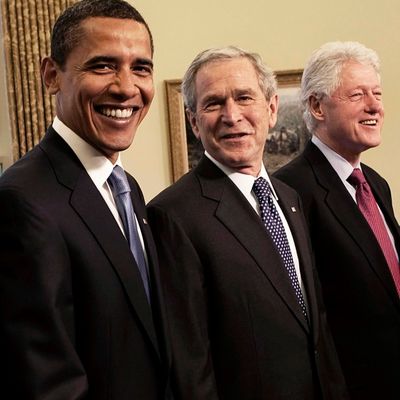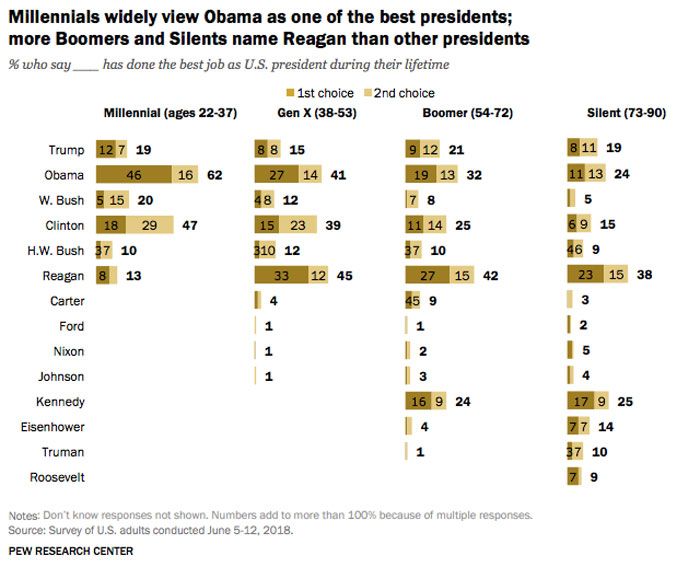
Which president in your lifetime, asks a new Pew survey, has done the best job? Perhaps unsurprisingly, the clear winner is Barack Obama, who was chosen by 31 percent of adults. Partisanship tends to rule the responses to this question, as it does most public questions these days. But what is most striking about this survey is the lack of a broadly popular Republican leader from the present era.
The most popular Republican ex-president is Ronald Reagan, who left office nearly 30 years ago. The current president, Donald Trump, fares poorly, as do both George H.W. Bush and George W. Bush. For all the damage Bill Clinton has suffered among Democratic Party activists in the fallout of the #MeToo revolution, his record still holds up well in the public mind. As Americans see it, the last two Democratic presidencies have been rousing successes, while the previous two Republican ones have been miserable failures.
The question this raises is, why haven’t Democrats capitalized on their success? Why have three decades of failed Republican presidencies and successful Democratic ones not left a deeper impression on the public?
The split is especially stark when you break it down by age. For voters under the age of 38, Obama is the runaway choice as best president of their lifetime. As many of these voters name him as pick the next five presidents combined:

No doubt much of this reflects not only the liberal leanings of younger voters but also the gap in experience: Only the oldest millennials remember much from Reagan’s era. Still, this illustrates the problem that the model of a perceived successful Republican president is increasingly ancient history.
Does any of this actually matter to voters? Until recently, Republicans acted as though it did. The failure of Jimmy Carter’s one term in office (the product of a combination of his own shortcomings, congressional diffidence, and energy shocks engineered by OPEC) became a central theme of Republican messaging for decades. Conservatives turned the very moderate Carter into a symbol of failed big-government liberalism. The rhetorical overkill used to describe a mediocre but well-intentioned presidency was so over-the-top it was parodied in a famous Simpsons bit:
Carter was a Republican bogeyman in 1988, and when Bill Clinton came along. Republicans were still using Carter as the model for everything the Democrats stood for when Obama left office, 36 years after Carter left.
This is an intuitive way to appeal to low-information voters, who may not have a lot of information about where candidates stand on every issue but do have a sense of whether things went well or poorly under different administrations. The basis for this winning Republican rhetorical gambit has disintegrated. But why haven’t Democrats reproduced it? After Reagan, around whom Republicans built a cult of personality that endures to this day, we had:
– a one-term Republican administration that left office during a recession and a nasty internal fight over “no new taxes” dogma meeting a deficit crisis;
– a two-term Democratic presidency that ended with 60 percent approval ratings;
– a failed two-term Republican presidency that ended in both foreign and domestic catastrophe and approval ratings in the low 30s;
– a two-term Democratic president who left office with 60 percent approval ratings.
That is a 28-year-long pattern, more than twice as long as the Carter-Reagan period that looms so large in the public mind. What I’m proposing here is a mystery without much of an answer. Why haven’t Democrats made more use of this?






























